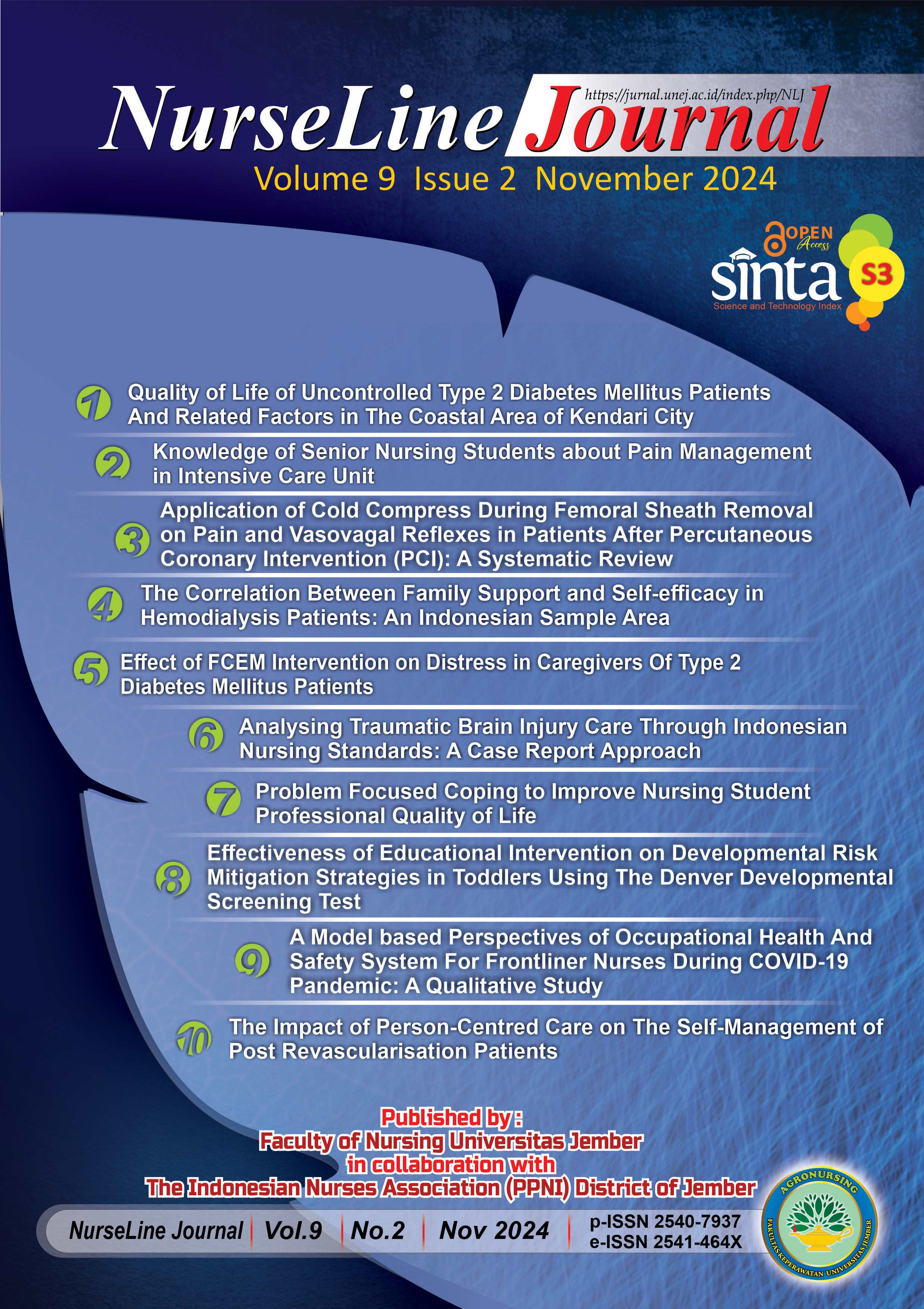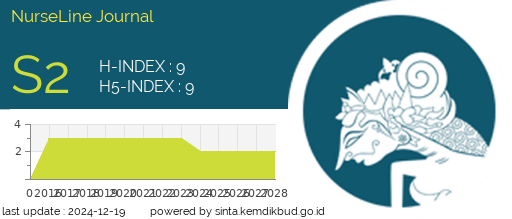Effect of FCEM Intervention on Distress in Caregivers Of Type 2 Diabetes Mellitus Patients
DOI:
https://doi.org/10.19184/nlj.v9i2.51742Keywords:
distress, diabetes, caregiver, empowermentAbstract
Type 2 Diabetes Mellitus (T2DM) is a chronic disease that presents significant challenges for the individuals suffering from it and their families. In caring for patients, caregivers accept responsibility and pressure, which increase the number of demands, causing them to feel tired and stressed. Nursing intervention, namely the Family Caregiver Empowerment Model (FCEM), empowers family members of T2DM sufferers as independent care providers at home. This model of empowering family members can provide an understanding of self-management of T2DM, minimizing the emergence of disease complications such as disability, decreased quality of life, and death. This research aims to analyze the effect of the Family Caregiver Empowerment Model intervention on distress in caregivers of T2DM patients in the working area of the Sumbersari Community Health Center, Jember Regency. This quasi-experimental research involved a sample of 74 respondents (35 in the intervention group and 39 in the control group), selected through cluster random sampling and receiving the FCEM intervention for 10 weeks. The instrument used was the Kingston Caregiver Stress Scale (KCSS) questionnaire. There is a significant effect of the FCEM intervention on the distress of family caregivers with type 2 diabetes mellitus. Data analysis was carried out using the Mann-Whitney U Test (Asymp. Sig. (2-tailed) = 0.000). These results indicate that the FCEM intervention effectively reduce distress for family caregivers of T2DM sufferers in the intervention group. This research can be applied as a program that supports the management of T2DM by empowering family members so that families can help manage and be independent in improving the health status and quality of life of T2DM patients.
Downloads
References
Amalia, A., & Rahmatika, R. 2020. Peran dukungan sosial bagi kesejahteraan psikologis family caregiver orang dengan skizofrenia (Ods) rawat jalan. Jurnal Ilmu Keluarga Dan Konsumen, 13(3), 228–238. https://doi.org/10.24156/jikk.2020.13.3.228
American Diabetes Association. 2023. Standards of care in diabetes-2023. https://diabetesjournals.org/care
Beth Fields, Keri L. Rodriguez, Lena K. Makaroun, Claire H. Robinson, Jane Forman, Ann-Marie Rosland. 2019. 659-P: Family caregivers' roles in supporting adults' self-management of diabetes. Diabetes; 68 (Supplement_1): 659–P. https://doi.org/10.2337/db19-659-P.
Blok, A. C., Valley, T. S., Weston, L. E., Miller, J., Lipman, K., & Krein, S. L. 2023. Factors Affecting Psychological Distress in Family Caregivers of Critically Ill Patients: a Qualitative Study. American Journal of Critical Care, 32(1), 21–30. https://doi.org/10.4037/ajcc2023593
Duarte, E. S. R., Silveira, L. V. D. A., CÃtero, V. de A., & Jacinto, A. F. 2018. Common mental disorder among family carers of demented older people in Brazil. Dementia e Neuropsychologia, 12(4), 402–407. https://doi.org/10.1590/1980-57642018dn12-040010
Gupta, S., Isherwood, G., Jones, K., & Van Impe, K. 2015. Assessing health status in informal schizophrenia caregivers compared with health status in non-caregivers and caregivers of other conditions. BMC Psychiatry, 15(1), 1–11. https://doi.org/10.1186/s12888-015-0547-1
Hopkins R, & Kilik L. 2016. "The kingston caregiver stress scale (kcss)" (KCSS Descriptive Paper) http://www.kingstonscales.org/caregiver-stress-scale.html
International Diabetes Atlas 10th edition [IDF]. 2021. International Diabetes Federation. In Diabetes Research and Clinical Practice (Vol. 102, Issue 2). https://doi.org/10.1016/j.diabres.2013.10.013
Jane, O. A., Olatunji, A., Bamiso, M. A., Kola, O. J., Ayodele, O. J., & Ideraoluwa, B. O. 2019. Burden of care andpPsychological distress in primary caregivers of patients with type -2 diabetes melitus in a tertiary hospital in nigeria. Ethiopian Journal of Health Sciences, 29(6), 697. http://ezproxy.javeriana.edu.co:2048/login?url=https://search.ebscohost.com/login.aspx?direct=true&db=edb&AN=140195210&lang=es&site=eds-live
Kristianingrum, N. D., Ramadhani, D. A., Hayati, Y. S., & Setyoadi, S. 2021. Correlation between the burden of family caregivers and health status of people with diabetes melitus. Journal of public health research, 10(2), 2227. https://doi.org/10.4081/jphr.2021.2227
Mirowsky J, Ross CE. 2003. Selecting outcomes for the sociology of mental health. Issues of measurement and dimensionality. Journal of health and social behavior. 43(1):152–170.
Perkumpulan Endokrinologi Indonesia. 2021. Pedoman pengelolaan dan pencegahan diabetes melitus tipe 2 dewasa di indonesia-2021 perkeni i Penerbit PB. PERKENI.
Rondhianto, Nursalam, Kusnanto, & Melaniani, S. 2021. Panduan pengelolaan mandiri diabetes melitus tipe 2 di rumah, panduan bagi perawat. In Penerbit: KHD Production.
Rondhianto, R. 2021. Pengembangan model pemberdayaan family caregiver sebagai upaya peningkatan kemampuan pengelolaan mandiri diabetes melitus tipe 2 di kabupaten jember. Disertasi.
Rondhianto, R., N. Nursalam, K. Kusnanto, dan S. Melaniani. 2022. The effect of family caregiver empowerment interventions on family caregiver capabilities in self-management of type 2 diabetes melitus in indonesia. Enfermeria Clinica. 32(6): 385-395.
Suhermin, A. 2021. Hubungan lama rawat inap dengan tingkat stres keluarga pasien tuberkulosis di ruang 29 rumah sakit dr. saiful anwar malang. Malang: Universitas Brawijaya.
Woodall, J., G. Raine, J. South, dan L. Warwick-Booth. 2010. Empowerment and health & wellbeing. Project Repor. 1-39.
Zan, H., Meng, Z., Li, J., Zhang, X., & Liu, T. 2024. Factors associated with quality of life among elderly patients with type 2 diabetes melitus: the role of family caregivers. BMC Public Health, 24(1), 1–9. https://doi.org/10.1186/s12889-024-17917-z









